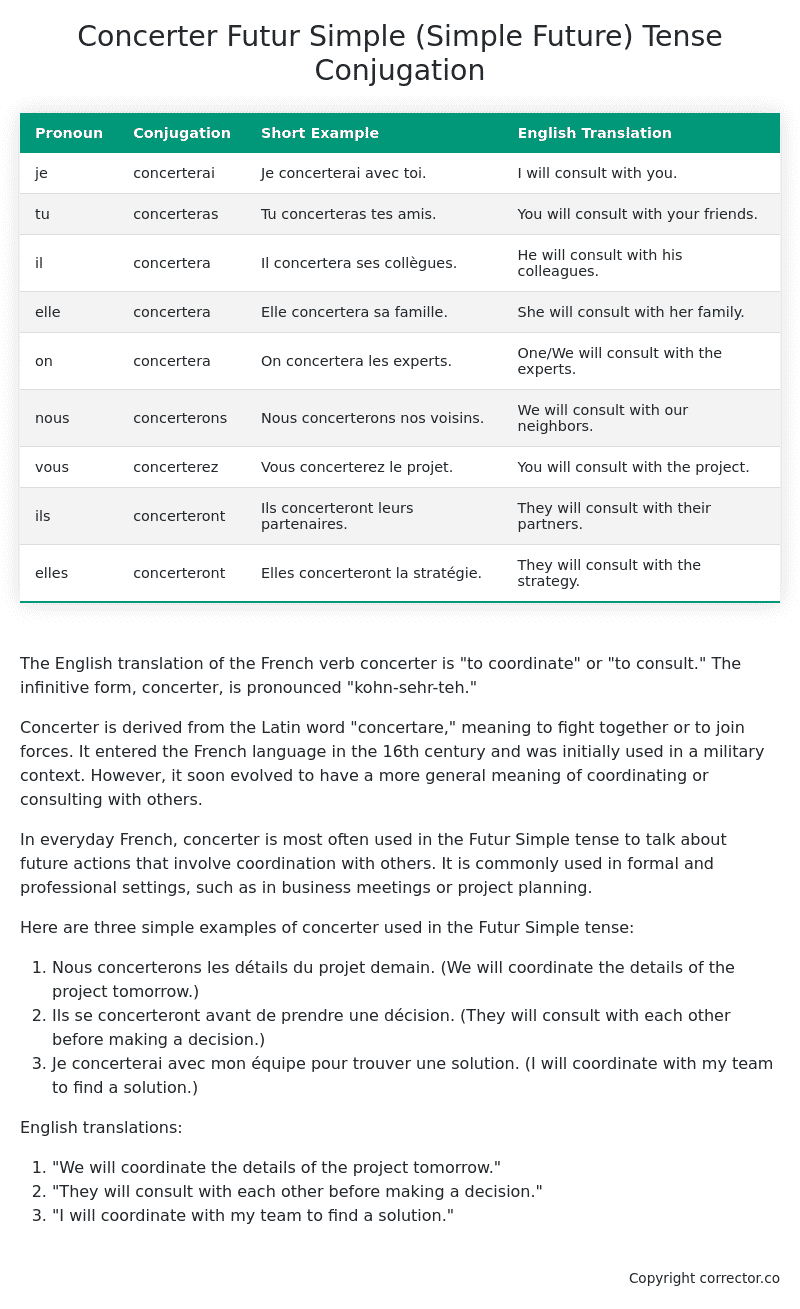Futur Simple (Simple Future) Tense Conjugation of the French Verb concerter
Introduction to the verb concerter
The English translation of the French verb concerter is “to coordinate” or “to consult.” The infinitive form, concerter, is pronounced “kohn-sehr-teh.”
Concerter is derived from the Latin word “concertare,” meaning to fight together or to join forces. It entered the French language in the 16th century and was initially used in a military context. However, it soon evolved to have a more general meaning of coordinating or consulting with others.
In everyday French, concerter is most often used in the Futur Simple tense to talk about future actions that involve coordination with others. It is commonly used in formal and professional settings, such as in business meetings or project planning.
Here are three simple examples of concerter used in the Futur Simple tense:
- Nous concerterons les détails du projet demain. (We will coordinate the details of the project tomorrow.)
- Ils se concerteront avant de prendre une décision. (They will consult with each other before making a decision.)
- Je concerterai avec mon équipe pour trouver une solution. (I will coordinate with my team to find a solution.)
English translations:
- “We will coordinate the details of the project tomorrow.”
- “They will consult with each other before making a decision.”
- “I will coordinate with my team to find a solution.”
Table of the Futur Simple (Simple Future) Tense Conjugation of concerter
| Pronoun | Conjugation | Short Example | English Translation |
|---|---|---|---|
| je | concerterai | Je concerterai avec toi. | I will consult with you. |
| tu | concerteras | Tu concerteras tes amis. | You will consult with your friends. |
| il | concertera | Il concertera ses collègues. | He will consult with his colleagues. |
| elle | concertera | Elle concertera sa famille. | She will consult with her family. |
| on | concertera | On concertera les experts. | One/We will consult with the experts. |
| nous | concerterons | Nous concerterons nos voisins. | We will consult with our neighbors. |
| vous | concerterez | Vous concerterez le projet. | You will consult with the project. |
| ils | concerteront | Ils concerteront leurs partenaires. | They will consult with their partners. |
| elles | concerteront | Elles concerteront la stratégie. | They will consult with the strategy. |
Other Conjugations for Concerter.
Le Present (Present Tense) Conjugation of the French Verb concerter
Imparfait (Imperfect) Tense Conjugation of the French Verb concerter
Passé Simple (Simple Past) Tense Conjugation of the French Verb concerter
Passé Composé (Present Perfect) Tense Conjugation of the French Verb concerter
Futur Simple (Simple Future) Tense Conjugation of the French Verb concerter (this article)
Futur Proche (Near Future) Tense Conjugation of the French Verb concerter
Plus-que-parfait (Pluperfect) Tense Conjugation of the French Verb concerter
Passé Antérieur (Past Anterior) Tense Conjugation of the French Verb concerter
Futur Antérieur (Future Anterior) Tense Conjugation of the French Verb concerter
Subjonctif Présent (Subjunctive Present) Tense Conjugation of the French Verb concerter
Subjonctif Passé (Subjunctive Past) Tense Conjugation of the French Verb concerter
Subjonctif Imparfait (Subjunctive Imperfect) Tense Conjugation of the French Verb concerter
Subjonctif Plus-que-parfait (Subjunctive Pluperfect) Tense Conjugation of the French Verb concerter
Conditionnel Présent (Conditional Present) Tense Conjugation of the French Verb concerter
Conditionnel Passé (Conditional Past) Tense Conjugation of the French Verb concerter
L’impératif Présent (Imperative Present) Tense Conjugation of the French Verb concerter
L’infinitif Présent (Infinitive Present) Tense Conjugation of the French Verb concerter
Struggling with French verbs or the language in general? Why not use our free French Grammar Checker – no registration required!
Get a FREE Download Study Sheet of this Conjugation 🔥
Simply right click the image below, click “save image” and get your free reference for the concerter Futur Simple tense conjugation!

Concerter – About the French Futur Simple (Simple Future) Tense
Formation of Futur Simple
For regular -er verbs (e.g., parler – to speak)
For regular -ir verbs (e.g., finir – to finish)
For regular -re verbs (e.g., vendre – to sell)
Common Everyday Usage Patterns
Conditional Statements
Interactions with Other Tenses
Futur Antérieur
Conditional
Present
Summary
I hope you enjoyed this article on the verb concerter. Still in a learning mood? Check out another TOTALLY random French verb conjugation!


